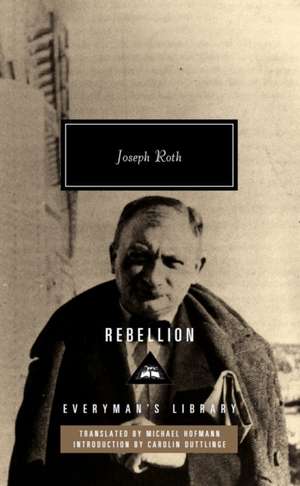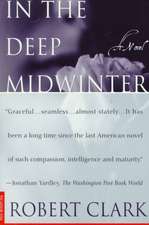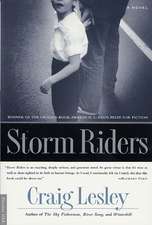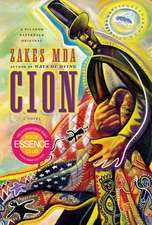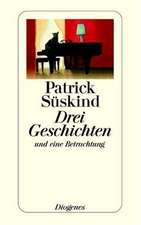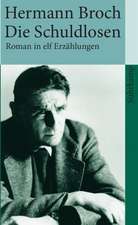Rebellion: Everyman's Library CLASSICS
Autor Joseph Roth Traducere de Michael Hofmannen Limba Engleză Hardback – 21 apr 2022
From Joseph Roth, an allegorical yet decidedly modern novelist, comes this story of postwar disillusion, the limits of faith, and "personal fate as governed by the blind, casual workings of a machine controlled by no one and for which no one is responsible" ("The New York Times").
When Andreas Pum returns from World War I, he has lost a leg but gained a medal. But unlike his fellow sufferers, Pum maintains his unswerving faith in God, Government, and Authority. Ironically, after a dispute, Pum is imprisoned as a rebel, and all that he believed in is now thrown into upheaval. Moving along at a breakneck clip, "Rebellion" captures the cynicism and upheavals of a postwar society. Its jazz-like cadences mix with social commentary to create a wise parable about justice and society.
| Toate formatele și edițiile | Preț | Express |
|---|---|---|
| Paperback (1) | 95.07 lei 6-8 săpt. | |
| Picador USA – 30 noi 2000 | 95.07 lei 6-8 săpt. | |
| Hardback (1) | 64.69 lei 24-30 zile | +24.38 lei 5-11 zile |
| EVERYMAN – 21 apr 2022 | 64.69 lei 24-30 zile | +24.38 lei 5-11 zile |
Din seria Everyman's Library CLASSICS
- 11%
 Preț: 112.93 lei
Preț: 112.93 lei - 12%
 Preț: 111.39 lei
Preț: 111.39 lei - 13%
 Preț: 74.80 lei
Preț: 74.80 lei - 11%
 Preț: 90.25 lei
Preț: 90.25 lei - 12%
 Preț: 76.62 lei
Preț: 76.62 lei - 11%
 Preț: 90.22 lei
Preț: 90.22 lei - 14%
 Preț: 73.47 lei
Preț: 73.47 lei - 14%
 Preț: 84.70 lei
Preț: 84.70 lei - 12%
 Preț: 118.20 lei
Preț: 118.20 lei - 17%
 Preț: 110.12 lei
Preț: 110.12 lei - 13%
 Preț: 97.36 lei
Preț: 97.36 lei - 12%
 Preț: 75.39 lei
Preț: 75.39 lei - 13%
 Preț: 63.36 lei
Preț: 63.36 lei - 11%
 Preț: 89.68 lei
Preț: 89.68 lei - 13%
 Preț: 74.61 lei
Preț: 74.61 lei - 12%
 Preț: 76.82 lei
Preț: 76.82 lei - 14%
 Preț: 62.03 lei
Preț: 62.03 lei - 13%
 Preț: 86.26 lei
Preț: 86.26 lei - 9%
 Preț: 94.86 lei
Preț: 94.86 lei - 12%
 Preț: 104.38 lei
Preț: 104.38 lei - 12%
 Preț: 76.74 lei
Preț: 76.74 lei - 14%
 Preț: 90.21 lei
Preț: 90.21 lei - 25%
 Preț: 158.17 lei
Preț: 158.17 lei - 23%
 Preț: 102.65 lei
Preț: 102.65 lei - 14%
 Preț: 83.48 lei
Preț: 83.48 lei - 11%
 Preț: 90.41 lei
Preț: 90.41 lei - 12%
 Preț: 87.77 lei
Preț: 87.77 lei - 12%
 Preț: 81.12 lei
Preț: 81.12 lei - 11%
 Preț: 89.81 lei
Preț: 89.81 lei - 13%
 Preț: 85.11 lei
Preț: 85.11 lei - 13%
 Preț: 366.37 lei
Preț: 366.37 lei - 12%
 Preț: 75.81 lei
Preț: 75.81 lei - 13%
 Preț: 62.73 lei
Preț: 62.73 lei - 14%
 Preț: 89.69 lei
Preț: 89.69 lei - 12%
 Preț: 92.90 lei
Preț: 92.90 lei - 13%
 Preț: 74.71 lei
Preț: 74.71 lei - 13%
 Preț: 73.59 lei
Preț: 73.59 lei - 10%
 Preț: 85.75 lei
Preț: 85.75 lei -
 Preț: 109.75 lei
Preț: 109.75 lei - 13%
 Preț: 68.30 lei
Preț: 68.30 lei -
 Preț: 84.44 lei
Preț: 84.44 lei - 10%
 Preț: 72.78 lei
Preț: 72.78 lei - 13%
 Preț: 114.51 lei
Preț: 114.51 lei - 14%
 Preț: 60.89 lei
Preț: 60.89 lei - 13%
 Preț: 85.00 lei
Preț: 85.00 lei - 16%
 Preț: 105.06 lei
Preț: 105.06 lei - 13%
 Preț: 79.64 lei
Preț: 79.64 lei - 12%
 Preț: 88.02 lei
Preț: 88.02 lei - 12%
 Preț: 87.10 lei
Preț: 87.10 lei - 13%
 Preț: 74.90 lei
Preț: 74.90 lei
Preț: 64.69 lei
Preț vechi: 76.65 lei
-16% Nou
12.38€ • 12.88$ • 10.22£
Carte disponibilă
Livrare economică 27 martie-02 aprilie
Livrare express 08-14 martie pentru 34.37 lei
Specificații
ISBN-10: 1841594075
Pagini: 168
Dimensiuni: 134 x 211 x 20 mm
Greutate: 0.3 kg
Editura: EVERYMAN
Seria Everyman's Library CLASSICS
